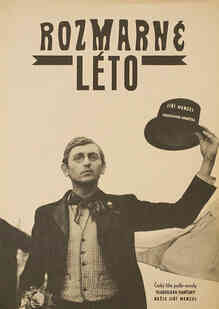Capricious Summer
DIRECTOR
Jiří Menzel
SCRIPT
Václav Nývlt, Jiří Menzel
Director Jiří Menzel is most closely associated with his adaptations of the works of writer Bohumil Hrabal. However, Menzel’s filmography also boasts two adaptations of books by novelist Vladislav Vančura. In 1967, along with screenwriter Václav Nývlt, Menzel successfully adapted the novel Rozmarné léto (Capricious Summer) for the screen. In 1989, joined by Jiří Blažek, he did the same with Konec starých časů (The End of Old Times). The first of these Menzel-Vančura adaptations is widely regarded as one of the director’s greatest works. Though made during the Czechoslovak New Wave era, Rozmarné léto is notable for its nostalgic, homely and escapist style. In presenting it in this fashion, the then 29-year-old director unwittingly set the tone for many similarly-themed Czechoslovak films of the 1970s and 80s. But unlike many adaptations of Hrabal’s works, Rozmarné léto stays faithful to the spirit of the novel, published by Vančura in 1926. The humorous story, filled with poeticism, is set in the fictitious river spa town of Krokovy Vary on the banks of the Silesian river Orši. The owner of a small bathing house, the hedonistic Antonín Důra (Rudolf Hrušínský), spends several rainy June days pseudo-philosophising with a great deal of pettifoggery in the company of his friends – the introvert, idealistic abbé Roch (František Řehák) and rationalistic major Hugo (Vlastimil Brodský). But tightrope walker Arnoštek (played by Jiří Menzel) and his assistant Anna (Jana Preissová) bring a degree of commotion to the lives of these layabouts. The three ageing men are enraptured by the beautiful Anna and expend much energy trying to woo her, albeit in vain. Meanwhile, Antonín’s wife Kateřina (Míla Myslíková) is bewitched by young Arnošt. This stylistically precise tale gains much from the beautiful cinematography of Jaromír Šofr. Menzel’s predilection for tragicomic sketches, wonderful dialogue from writer Vančura, and outstanding acting performances by the main actors, helped this film to win the Crystal Globe at the 1968 Karlovy Vary film festival. To this day, the film remains a shining example of a truly successfully adaptation of a complex literary work. Hrušínský, Brodský and Preissová would return to their film roles by way of a radio play dramatisation written and directed by Menzel in 1972.
Actors: Rudolf Hrušínský, Míla Myslíková, Vlastimil Brodský, František Řehák, Jana Preissová, Jiří Menzel, Bohuš Záhorský, Vlasta Jelínková, Karel Hovorka st., Bohumil Koška, Vladimír Pátek, Alois Vachek
Československo, 1967, 74 min.,
CZ




